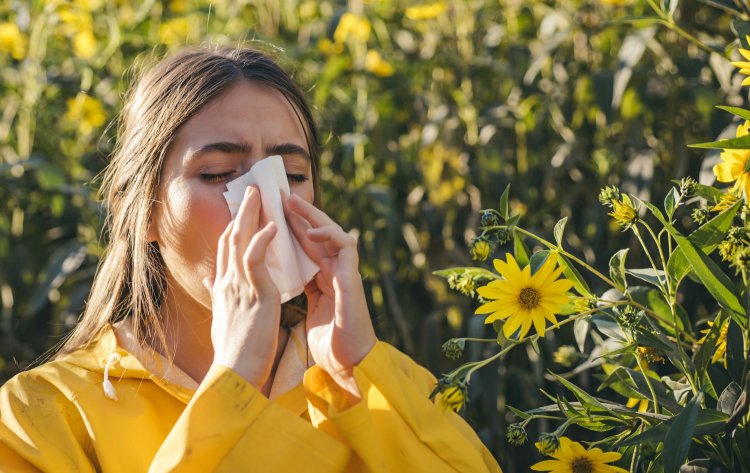Allergic to Spring? Navigating the World of Pollen Allergies
Pollen allergy, also known as allergic rhinitis or hay fever, is a widespread allergic reaction to pollen grains released by trees, grasses, weeds, and certain plants. This allergic condition affects millions of individuals worldwide, causing discomfort and interfering with daily activities, particularly during seasons of high pollen levels. This article delves deeper into the complexities of pollen allergy, exploring its underlying causes, wide-ranging symptoms, diagnostic approaches, and comprehensive management strategies.

Causes of Pollen Allergy
Pollen allergy stems from an immune system malfunction whereby harmless pollen particles are mistakenly identified as threats. In response to pollen exposure, the immune system produces specific antibodies known as immunoglobulin E (IgE). Upon subsequent exposure, these IgE antibodies trigger the release of inflammatory chemicals, including histamine, leading to allergic symptoms.
Several factors contribute to the development of pollen allergy, including genetic predisposition, environmental exposure to pollen, and individual immune system responses. Additionally, various environmental and lifestyle factors, such as air pollution, climate change, and tobacco smoke exposure, can exacerbate allergic reactions to pollen.
Symptoms of Pollen Allergy
The symptoms of pollen allergy can manifest across multiple organ systems and vary in intensity from mild to severe. Common symptoms include:
- Sneezing: Persistent bouts of sneezing, particularly upon waking or venturing outdoors.
- Nasal Symptoms: Runny or congested nose, accompanied by itching and clear nasal discharge.
- Ocular Manifestations: Itchy, watery eyes, redness, and swelling (allergic conjunctivitis).
- Throat Irritation: Postnasal drip leading to throat discomfort, coughing, and throat clearing.
- Fatigue: Chronic fatigue or lethargy due to disrupted sleep patterns caused by allergic symptoms.
- Respiratory Distress: Wheezing, chest tightness, and shortness of breath, especially in individuals with underlying asthma.
These symptoms typically occur shortly after exposure to pollen and may persist as long as the individual remains in the pollen-rich environment.
Diagnosis of Pollen Allergy
Accurate diagnosis of pollen allergy involves a comprehensive evaluation by a healthcare professional. This evaluation typically includes:
- Medical History Assessment: In-depth inquiry into the nature, frequency, and duration of allergic symptoms, as well as potential triggers and family history of allergies.
- Physical Examination: Examination of the nasal passages, throat, and eyes to assess for signs of allergic inflammation and congestion.
- Allergy Testing: Allergy tests, such as skin prick testing or specific IgE blood tests, can identify the specific pollen allergens triggering the immune response. These tests involve exposing the skin or blood sample to various allergens, including pollen extracts, and observing the immune reaction.
Management Strategies for Pollen Allergy
Managing pollen allergy effectively requires a multifaceted approach aimed at reducing exposure to pollen and alleviating allergic symptoms. Key management strategies include:
- Environmental Control: Minimize outdoor activities during peak pollen seasons, keep windows closed, use air conditioning with HEPA filters, and avoid outdoor activities on windy days.
- Allergy-Proofing the Home: Use allergen-impermeable bedding covers, vacuum regularly with a high-efficiency particulate air (HEPA) filter, and consider installing an air purifier to reduce indoor pollen exposure.
- Nasal Irrigation: Regular nasal irrigation with saline solution can help rinse away pollen particles and alleviate nasal congestion and irritation.
- Pharmacological Therapy: Over-the-counter and prescription medications, including antihistamines, nasal corticosteroids, decongestants, and eye drops, can effectively relieve pollen allergy symptoms. Consultation with a healthcare professional is essential to determine the most appropriate medication regimen.
- Allergen Immunotherapy: In cases of severe or persistent pollen allergy, allergen immunotherapy may be recommended. This treatment involves administering gradually increasing doses of allergens, including pollen extracts, to desensitize the immune system and reduce allergic reactions over time.
In conclusion, pollen allergy is a complex allergic condition characterized by immune-mediated inflammation in response to pollen exposure. While it can significantly impact quality of life, effective management strategies are available to alleviate symptoms and improve overall well-being. By understanding the underlying causes, diverse symptoms, diagnostic approaches, and comprehensive management options for pollen allergy, individuals can take proactive steps to minimize exposure and seek appropriate treatment when needed. If you suspect you have pollen allergy, consult a healthcare professional for accurate diagnosis and personalized management recommendations.
#PollenAllergy #AllergySymptoms #AllergyDiagnosis #AllergyManagement #HealthcareTips #WellnessManagement #HealthAwareness #AllergyPrevention #HealthEducation #ConsultYourDoctor #PollenSeason #HealthyLiving #MedicalAdvice #HealthAndWellness
Disclaimer:
The information provided in this article is for educational purposes only and should not be considered medical advice. If you have any health concerns or are experiencing symptoms, it is important to consult with a healthcare professional, such as a doctor or clinic, for proper diagnosis and treatment. Always seek the advice of your doctor or other qualified health provider with any questions you may have regarding a medical condition. Do not disregard professional medical advice or delay in seeking it because of something you have read in this article.
What's Your Reaction?





















